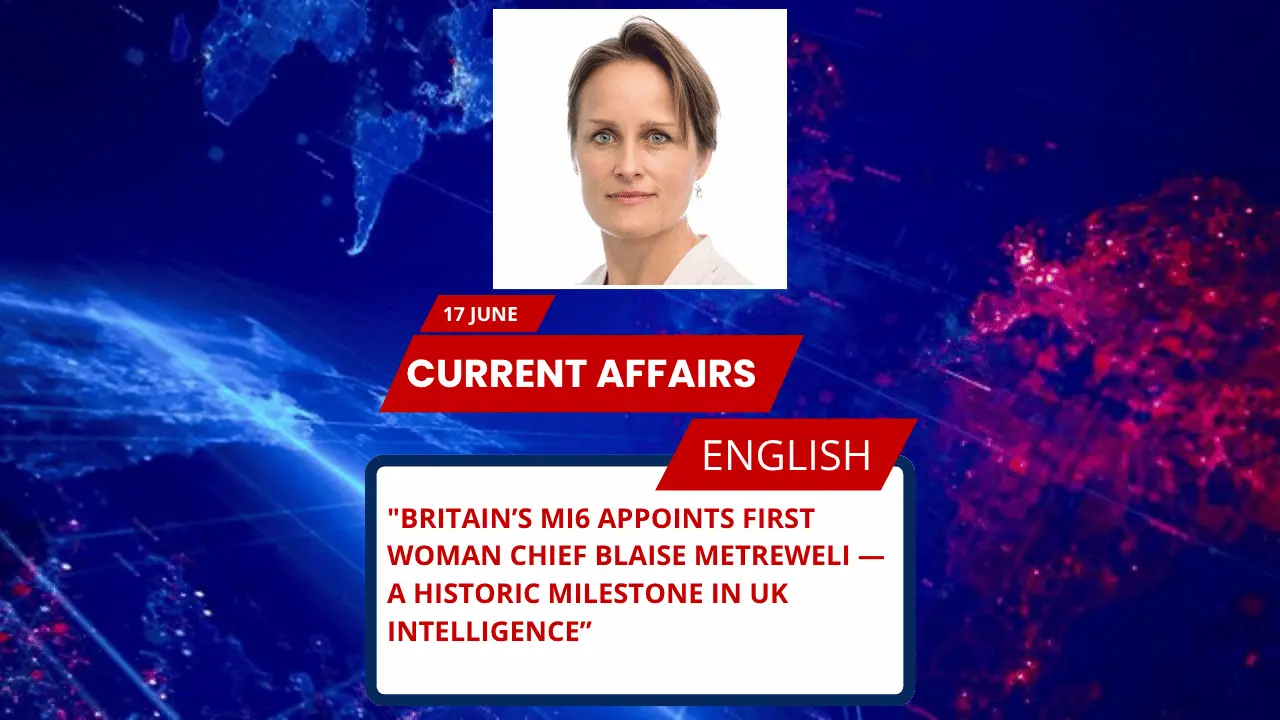
Key Points for SSC, UPSC & Other Govt Exams
- Blaise Metreweli becomes the first woman to head Britain’s MI6 (Secret Intelligence Service) since its establishment in 1909.
- She will replace Richard Moore, who served as MI6 chief for five years.
- Metreweli is currently Director of Technology and Innovation at MI6.
- She holds an Anthropology degree from Cambridge University and was part of its women’s rowing team.
- The appointment was announced by UK Prime Minister Keir Starmer during the G7 summit in Alberta, Canada.
- MI5 and GCHQ, other UK intelligence agencies, have had women leaders before MI6.
- Major challenges faced by MI6: threats from China, Russia, cyber warfare, and terrorism.
Detailed Explanation
H1: MI6 Makes History with First Female Chief
Britain’s Secret Intelligence Service (commonly known as MI6) has broken a 115-year-old tradition by appointing Blaise Metreweli as its new chief. The appointment is seen as a landmark moment in British intelligence history, aligning with broader efforts towards gender equality in national security roles.
H2: Who is Blaise Metreweli?
Metreweli, aged 47, is a career intelligence officer with over 25 years of service in MI6. Prior to this appointment, she served as the Director of Technology and Innovation, effectively functioning as MI6’s real-life version of the famed gadget master “Q” from James Bond films.
Her academic background includes a degree in Anthropology from Cambridge University, where she also excelled in sports as part of the women’s rowing team.
H2: The Significance of This Appointment
This historic appointment, announced by Prime Minister Keir Starmer during the G7 leaders’ summit in Canada, reflects the evolving nature of MI6. The agency is moving beyond its traditional recruitment pool of elite universities towards a more inclusive and diverse workforce.
Metreweli’s appointment comes at a time when Britain faces increasing threats from state actors like China and Russia, as well as challenges from cyber attacks and terrorism.
H2: Comparison with Other UK Intelligence Agencies
- MI5: The domestic security service, has been headed by women twice — Stella Rimington (1992-1996) and Eliza Manningham-Buller (2002-2007).
- GCHQ: The UK’s electronic surveillance agency, is currently led by Anne Keast-Butler (since 2023).
H3: The Process of Selection
Unlike the fictional James Bond world where M chooses agents, the real process involved Britain’s top civil servant inviting applications across government departments. The final choice was an internal MI6 candidate — Metreweli — noted for her technological expertise and operational leadership.
About the Organization: MI6
- Full Name: Secret Intelligence Service (SIS)
- Founded: 1909
- Headquarters: London, United Kingdom
- Primary Role: Foreign intelligence gathering and covert operations to protect UK national security
- Supervising Minister: UK Foreign Secretary (currently David Lammy)
- Famous Fictional Depiction: James Bond series (fictional MI6 chief called “M”)
Potential MCQs for Exams
1. Who is the first woman appointed as the chief of Britain’s MI6?
A) Stella Rimington
B) Anne Keast-Butler
C) Blaise Metreweli
D) Eliza Manningham-Buller
Answer: C) Blaise Metreweli
2. MI6 was founded in which year?
A) 1905
B) 1909
C) 1914
D) 1920
Answer: B) 1909
3. Blaise Metreweli was announced as MI6 chief during which international summit?
A) BRICS Summit
B) UN General Assembly
C) G7 Leaders’ Summit
D) NATO Meeting
Answer: C) G7 Leaders’ Summit
4. Who is the UK Foreign Secretary under whom MI6 operates?
A) Richard Moore
B) Keir Starmer
C) David Lammy
D) Boris Johnson
Answer: C) David Lammy
5. Which UK intelligence agency was first headed by a woman?
A) MI6
B) MI5
C) GCHQ
D) SOE
Answer: B) MI5
UPSC-Style FAQs (Answer Writing Format)
Q1. Discuss the significance of Blaise Metreweli’s appointment as the first female chief of MI6 in the context of gender inclusivity in intelligence agencies.
Answer:
The appointment of Blaise Metreweli as the first female chief of MI6 marks a watershed moment in the 115-year history of Britain’s foreign intelligence service. This development is significant because it reflects a broader commitment to gender inclusivity in national security structures, traditionally seen as male-dominated.
MI6’s decision aligns with the earlier appointments of female chiefs at MI5 and GCHQ, indicating a gradual dismantling of institutional glass ceilings. It also resonates with global conversations around equality and diversity in leadership roles. Furthermore, Metreweli’s technological expertise underscores the increasing importance of innovation in modern intelligence operations, particularly in countering threats from cyber warfare and state-sponsored espionage.
Her leadership may inspire reforms in recruitment, talent retention, and operational strategy, positioning MI6 to address emerging challenges effectively while setting an example of gender-balanced governance.
Q2. How does the selection of an internal candidate like Blaise Metreweli for MI6 chief reflect on the agency’s priorities in the current geopolitical environment?
Answer:
Blaise Metreweli’s selection as MI6 chief, from within the agency, reflects MI6’s prioritization of continuity, operational experience, and technological expertise amid a complex global security landscape. With over 25 years in the organization and as Director of Technology and Innovation, Metreweli is well-versed in both traditional espionage and modern cyber-intelligence tools.
Her appointment signals MI6’s focus on adapting to challenges such as cyber threats from China and Russia, hybrid warfare, and terrorism. The internal selection also indicates the agency’s intent to build on its existing institutional knowledge and capabilities rather than pursue an outsider’s vision at a time of heightened security risks.
This decision illustrates the balancing act between modernizing intelligence operations and preserving core values and practices that have historically underpinned British national security efforts.
Q3. Evaluate the impact of global summits like the G7 on national security policy announcements such as the appointment of MI6 chief.
Answer:
Global summits like the G7 provide an important platform for national leaders to coordinate policies, showcase strategic decisions, and reinforce commitments to collective security. The announcement of Blaise Metreweli’s appointment during the G7 summit serves multiple purposes.
Firstly, it highlights the UK’s transparency and resolve in reshaping its intelligence leadership in view of contemporary threats. Secondly, it strengthens the UK’s image as a progressive and adaptive security partner among global allies, particularly in countering shared threats such as cyber-attacks and authoritarian influence operations.
Lastly, by timing the announcement with the summit, the UK underscores the interconnected nature of national intelligence leadership and international cooperation in safeguarding global stability. Such platforms enhance diplomatic signaling and consolidate strategic alignments among like-minded nations.







